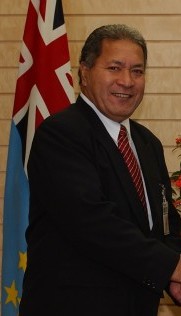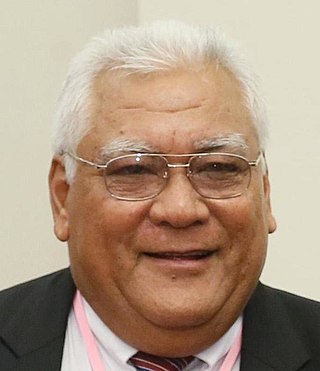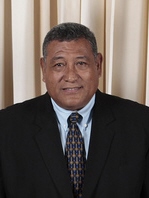Related Research Articles
The politics of Tuvalu takes place in a framework of a parliamentary representative democratic monarchy, whereby the monarch is the head of state, represented by the governor-general, while the prime minister is the head of government. Executive power is exercised by the government.

Saufatu Sopoanga was a Tuvaluan politician who served as the eighth prime minister of Tuvalu from 2 August 2002 to 27 August 2004. He drew international attention for his speeches warning about the effects of the rising sea level on Tuvalu and other low-lying island countries.
Sir Tomasi Puapua is a political figure who represented Vaitupu in the Parliament of Tuvalu. He attended the Fiji School of Medicine and the Otago University Medical School. He married Riana Puapua.

Maatia Toafa OBE is a Tuvaluan politician, representing Nanumea, who served two non-consecutive terms as Prime Minister of Tuvalu. He first served as prime minister, and foreign minister, from 2004 to 2006, from the resignation of his predecessor, Saufatu Sopoanga, until the defeat of his Cabinet in the 2006 general election. From 2004 to 2006 he also held the role of foreign minister.
Tuvalu elects a legislature on a national level. The Parliament of Tuvalu has 16 members, elected for a four-year term in 8 double-seat constituencies. Tuvalu is a de facto non-partisan democracy since it does not have political parties. The political system is based on personal alliances and loyalties derived from clan and family connections. It does tend to have both a distinct government and a distinct opposition. The 16 members of the current parliament are elected from eight two-seat constituencies via plurality block voting.
Sir Tomu Malaefone Sione,, was a political figure from the Pacific nation of Tuvalu. He worked as a journalist from 1962 to 1968, and held the post of radio announcer in the Broadcasting and Information Department of the administration of the Gilbert and Ellice Islands Colony (GEIC). He was the head of the southern Niutao clan. He was married to Segali.

Sir Kamuta Latasi is a political figure from the Pacific nation of Tuvalu from Funafuti atoll. He was elected to the Parliament of Tuvalu in 1992. Latasi served as the 4th prime minister, and foreign minister, from 1993 until 1996. He has served as the Speaker of parliament from 2006 to September 2010 and again from December 2010 to March 2014.

Apisai Ielemia was a Tuvaluan politician. He served as the tenth Prime Minister of Tuvalu from 2006 to 2010, and also held the role as Foreign Minister. He was returned as a member of parliament in the 2010 Tuvaluan general election. He was re-elected to parliament in the 2015 Tuvaluan general election. On 5 October 2016 Chief Justice Sweeney of the High Court of Tuvalu declared that Ielemia’s parliamentary seat was vacant as he was not qualified to be a member of parliament, as the consequence of the short time the opposition MP served time in jail following his conviction on 6 May 2016 in the Magistrate’s Court of charges of abuse of office during the final year of his term as prime minister. The abuse of office charges related to payments deposited into a National Bank of Tuvalu personal account. The 5 October 2016 decision of the Chief Justice was controversial as it appeared to contradict the June 2016 decision of Justice Norman Franzi of the High Court of Tuvalu that had quashed Ielemia’s conviction and acquitted him of the abuse of office charges. The appeal to the High Court held that the conviction was "manifestly unsafe," with the court quashing the 12-month jail term.
General elections were held in Tuvalu on 3 August 2006 to elect fifteen members to the Parliament. There were 5,765 eligible voters on the electoral roll. 32 candidates, including 2 women, competed for the 15 seats. All fifteen candidates elected were Independents, as there are no political parties in the country.

Willy Telavi is a Tuvaluan politician who was Prime Minister of Tuvalu from 2010 to 2013.
Lotoala Metia was a Tuvaluan politician and football player.
Taukelina Finikaso is a political figure from the Pacific nation of Tuvalu. At the 2006 general election, he was elected MP for his home constituency of Vaitupu. He was educated in Kiribati and Fiji before acquiring a Law Degree at the University of Tasmania and a master's degree in International Law from Sydney University. Finikaso was admitted on 16 October 1987 to the Supreme Court of the Australian Capital Territory. Prior to entering into politics, Finikaso worked as a lawyer and then as a Permanent Secretary under the different ministries of the Government. Finikaso has been a Member of Parliament for the Constituency of Vaitupu from 2006 to 2019. He was not re-elected in the 2019 general election.

Tavau Teii is a political figure from the Pacific nation of Tuvalu.
The Cabinet of Tuvalu is the executive branch of the government of Tuvalu.
A by-election was held in the Niutao constituency in Tuvalu on 5 May 2003. It was triggered by the death of the incumbent MP, Saloa Tauia. Tauia, the Speaker of Parliament, died in February, after having entered Parliament in the July 2002 general election.

The Ielemia Ministry was the 11th ministry of the Government of Tuvalu, led by Prime Minister Apisai Ielemia. It succeeded the First Toafa Ministry following the 2006 election, but was voted out of office after the 2010 election and was succeeded by the Second Toafa Ministry, led by Maatia Toafa.
References
- 1 2 3 Hassall, Graham (2006). "The Tuvalu General Election 2006". Democracy and Elections project, Governance Program, University of the South Pacific. Retrieved 11 April 2015.
- 1 2 "Palamene o Tuvalu (Parliament of Tuvalu)". Inter-Parliamentary Union. 2006. Retrieved 7 March 2013.
- ↑ "Tuvalu-news.tv". Apisai Ielemia New Prime Minister. 16 August 2006. Archived from the original on 1 March 2013. Retrieved 9 March 2013.